Key takeaways
- Legal realism challenges the notion of law as fixed rules, emphasizing its dynamic nature shaped by human experiences and societal influences.
- Holmes views judges as active decision-makers whose predictions and personal biases play a crucial role in legal outcomes, advocating for a more human-centered approach to law.
- Embracing uncertainty in legal reasoning encourages a deeper appreciation of the law’s complexity and its evolution in response to changing societal values.
- Holmes’ philosophy calls for humility in understanding the law, acknowledging the role of personal experiences in shaping judicial decisions and the pursuit of fairness.
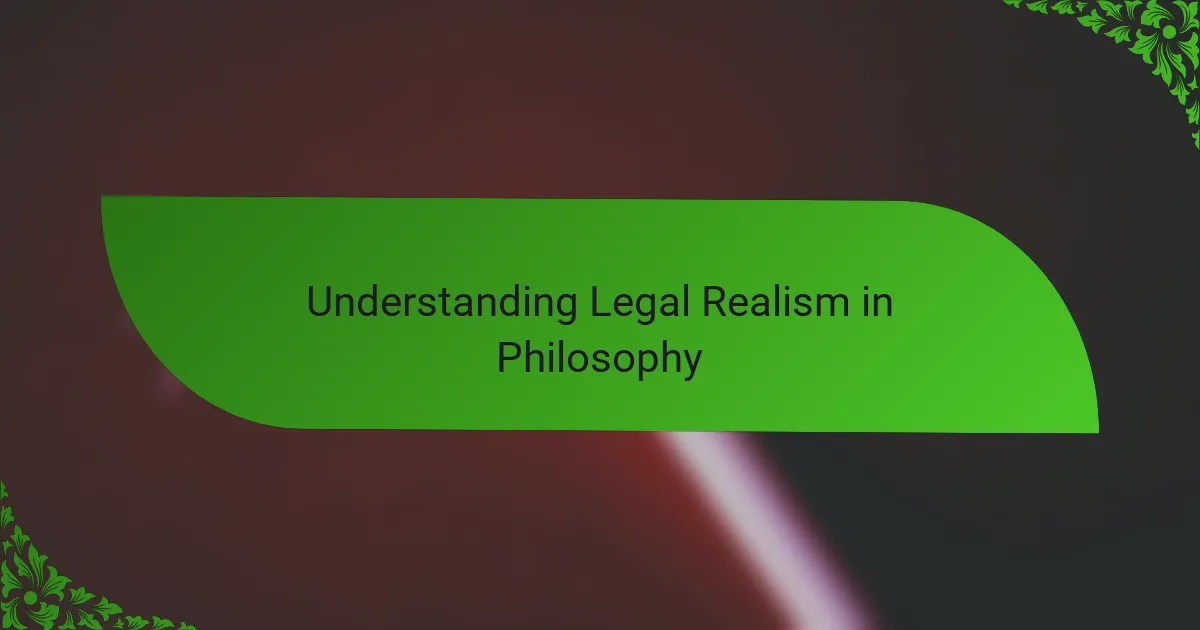
Understanding Legal Realism in Philosophy
Legal realism challenges the idea that law is a fixed set of abstract rules. I remember first encountering this perspective and feeling a bit unsettled—how could something so foundational be so flexible? But then it clicked: laws are not just written texts; they’re lived experiences shaped by judges, society, and circumstances.
Have you ever wondered why two cases that seem similar end with different outcomes? Legal realism answers this by emphasizing the role of human judgment, biases, and social factors in legal decisions. It’s like seeing law not as a rigid system but as an evolving dialogue influenced by the real world.
What I find most captivating is how legal realism brings philosophy down from the clouds into everyday life. It forces us to confront how power, politics, and personal beliefs weave into the fabric of justice. This perspective doesn’t just explain law—it makes it feel deeply human.

Overview of Holmes’ Contributions
Holmes’ contributions to legal realism feel like a breath of fresh air to me because he shifted the focus from abstract legal principles to how laws actually work in practice. When I dove into his writings, I was struck by his insistence that law is less about fixed rules and more about the predictions judges make regarding how courts will decide. Have you ever thought about law as a sort of “forecast” rather than a set of commandments?
What’s powerful about Holmes is how he embraced the messy realities of human behavior in legal systems. I remember reflecting on his famous idea that “the life of the law has not been logic; it has been experience.” This resonated deeply with me because it acknowledges that laws evolve with society’s changing values and circumstances—something that feels both practical and profoundly true.
Holmes also challenges us to consider the role of judges beyond mere interpreters of statutes. In my experience, recognizing that judges bring their own biases and perspectives into decisions isn’t cynical—it’s realistic. It opens the door to asking difficult questions about fairness and transparency that remain critical in philosophy and legal education today.
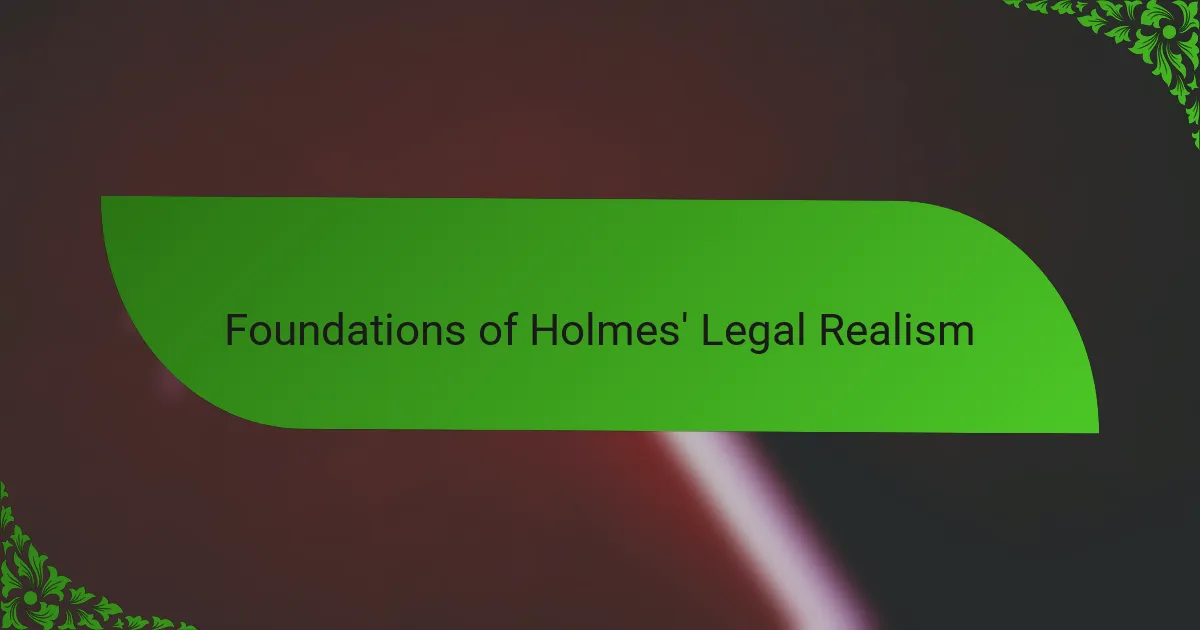
Foundations of Holmes’ Legal Realism
Holmes’ legal realism rests on a simple yet profound foundation: law is not a set of abstract, unchanging rules but a reflection of real-world experiences. When I first read Holmes, his idea that “the life of the law has not been logic; it has been experience” struck me as both radical and refreshingly honest. It made me question everything I thought I knew about law’s certainty.
Have you noticed how often legal outcomes hinge on who’s making the decision rather than just the written words? Holmes believed that judges don’t just apply laws—they predict how other courts will rule and bring their own personal views into the mix. This insight felt like uncovering a hidden layer beneath the surface of legal reasoning.
What really resonates with me is how Holmes brought human psychology and social realities into legal analysis. His foundation wasn’t cold logic but pragmatic observation of how law truly operates. This challenges us to see legal philosophy as a living, breathing process shaped by people and circumstances, not just abstract ideals.

Applying Holmes’ Ideas in Philosophy Education
When I first tried applying Holmes’ ideas in philosophy education, I realized it transforms how students engage with the law. Instead of memorizing rigid rules, they start to see law as a dynamic process shaped by human choices and societal forces. Have you noticed how this shift sparks deeper curiosity about why legal systems function the way they do?
In my experience, encouraging students to think like Holmes—considering law as a prediction shaped by experience—invites rich discussions about justice and fairness. It’s thrilling to watch learners wrestle with the idea that judges bring their own perspectives into rulings, which challenges simplistic views of objectivity. This approach not only clarifies legal realism but also connects philosophical concepts to real-world dilemmas.
One time, I asked my class how understanding Holmes might change their view of authority and rules. The answers revealed a newfound skepticism, but also hope—that law can adapt because it is lived and interpreted by people. I believe this embodies the spirit of philosophy education: to question, to understand complexity, and ultimately, to see the world more clearly.
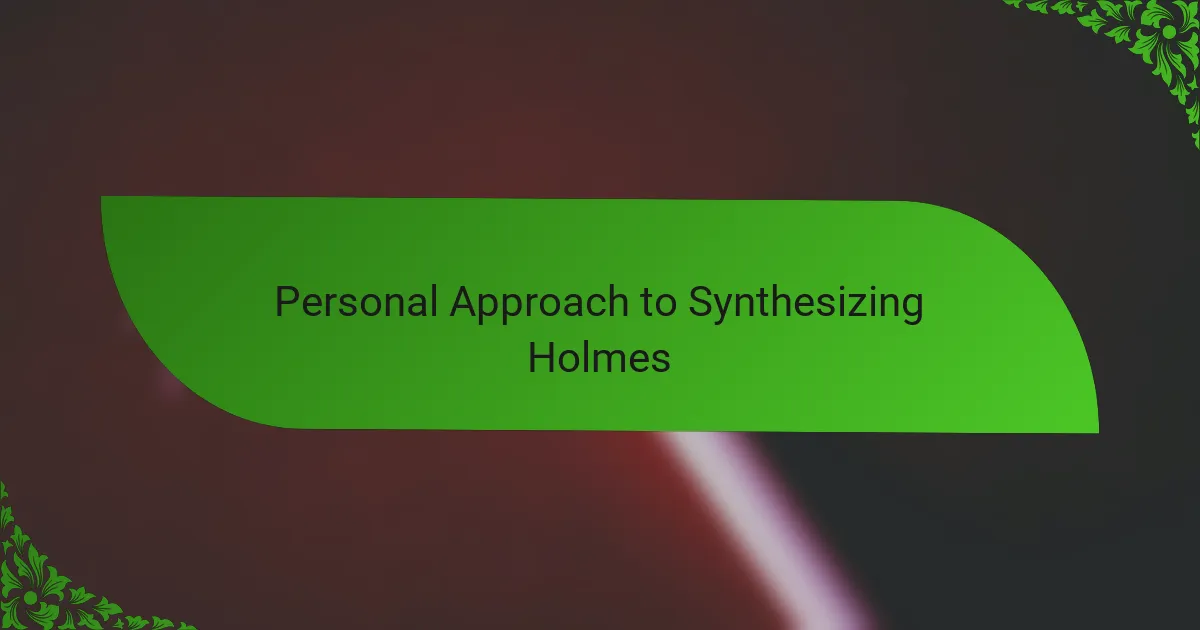
Personal Approach to Synthesizing Holmes
Synthesizing Holmes’ legal realism felt, at times, like piecing together a puzzle from fragments scattered across history and philosophy. I often asked myself, how do I balance his pragmatic insights with the need for philosophical clarity? Through countless reflections, I found that embracing the tension between law as prediction and law as lived experience makes his realism resonate more fully in my own thinking.
There was a moment when I realized that Holmes isn’t just a thinker to study but a lens through which to examine my assumptions about law and justice. I remember jotting down notes after a long walk, feeling that his emphasis on experience challenged me to acknowledge my own biases as I navigate legal ideas. Isn’t that honesty exactly what philosophy should demand?
What surprises me most in this personal process is how Holmes’ realism didn’t just change how I understand law—it changed how I listen to others’ stories about it. By viewing legal principles as evolving and contingent, I found myself more open to complexity and less trapped by rigid dogma. Have you ever felt that a single perspective can expand when you allow room for doubt? That’s the heart of my approach to synthesizing Holmes.
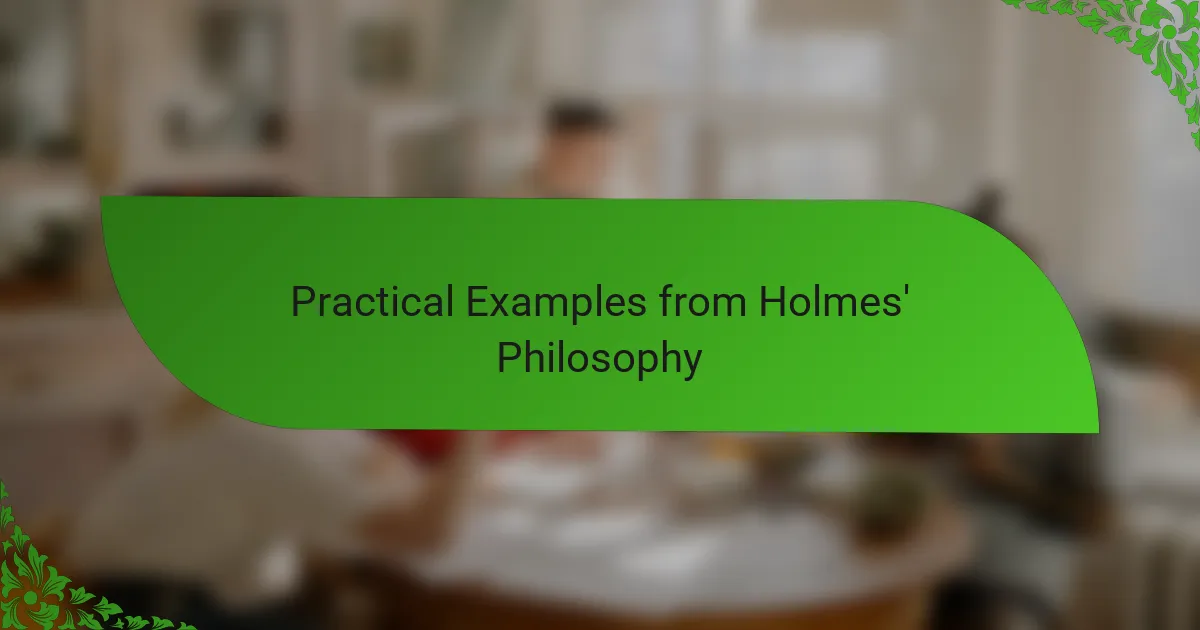
Practical Examples from Holmes’ Philosophy
One vivid example from Holmes’ philosophy comes from his view of judges as predictors rather than mere interpreters of law. I recall reading a case where a judge openly weighed how higher courts might rule instead of strictly following precedent. This practical approach felt like a breath of realism—it reflects how law lives and breathes in unpredictable human hands.
Another moment that struck me was Holmes’ candid acknowledgment that personal biases influence judicial decisions. At first, this felt unsettling—doesn’t justice demand impartiality? But then I remembered a recent courtroom drama I followed, where empathy and personal belief clearly shaped the outcome. Holmes wasn’t endorsing bias; he was urging us to face this reality so we can strive for fairness more honestly.
Lastly, I found Holmes’ insight on law evolving through experience especially powerful when thinking about societal change. For example, consider how legal attitudes toward technology have shifted dramatically in a few decades. Holmes’ philosophy helps me appreciate that law must adapt as society’s experiences and values evolve, not just stick rigidly to old rules. Doesn’t that make law feel more like a living conversation than a dead set of instructions?
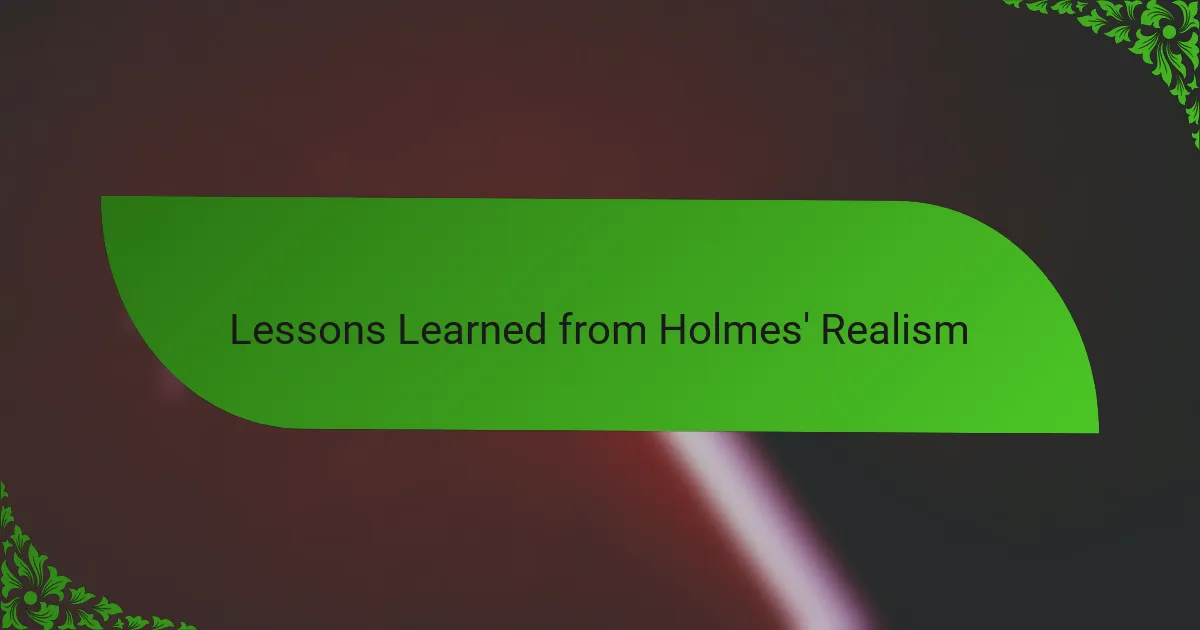
Lessons Learned from Holmes’ Realism
What stands out to me most about Holmes’ realism is how it teaches us to embrace uncertainty instead of fearing it. I remember grappling with the idea that law isn’t a fixed science but a continuously shifting process influenced by human factors. Isn’t that unsettling at first? Yet, recognizing this unpredictability feels oddly liberating, because it invites us to look beyond black-and-white answers and appreciate the law’s complexity.
Another lesson I keep returning to is Holmes’ insistence that understanding law means appreciating the judge’s role—not as a passive rule-follower, but as an active decision-maker influenced by experience and context. This made me reflect on moments where I encountered legal debates, realizing that behind every ruling is a human story shaping the outcome. Doesn’t that human element make the pursuit of justice feel more tangible and urgent?
Finally, Holmes’ realism challenges us to rethink the ideal of impartiality. At first, acknowledging judges’ biases seemed like admitting flaws in the system. But then I saw it as a call for humility—both in the courtroom and in ourselves. From my experience, when we accept that law evolves through lived experience rather than cold logic alone, we open the door to continuous improvement and deeper fairness. Isn’t that what philosophy, at its best, helps us strive toward?